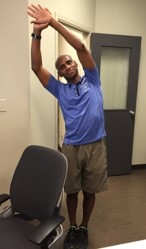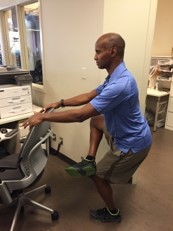While some workplace stress is to be expected, excessive stress can interfere with productivity and performance, impact your physical and emotional health, and affect your relationships and home life. You can’t control everything in your work environment, but you can incorporate some daily activities to reduce the impact of stress in the workplace!
1. Movement
One reason your energy may be dropping at work could be that you’ve been sitting for too long. Try getting up out of your chair and moving around for at least a few minutes every hour. Try shoulder and arm circles, hip rotations, knees up, hamstring curls and reaching over the head to open up the area of your ribs. Instead of sending an email, go to your colleague’s office. Schedule a walking meeting. Take the stairs to the restroom a few floors away. Just find a reason to move around and be more active. Engaging in small bursts of physical activity can help to re-energize your body and mind.
2. Stretch it out!
Sitting at a desk can create imbalance in the body, overly emphasising certain muscles while “turning off” others. This can contribute to poor posture, back and joint pain, and more. Stretching is one of the most effective ways we can help bring the body into muscular balance.
3. Breath & Relaxation
We can completely change our physiological, mental and emotional state with deeper, more effective breathing and
Nostril Breathing: Breathing through the nose as oppose to the mouth warms the breath and has an immediate calming effect as it brings us into our parasympathetic nervous system (our rest and relax system).
Abdominal Breathing: Initiating our breath in the belly uses the largest and lowest regions of the lungs, contributing to more oxygen and vital energy in the body as well as increased lung capacity.
Extended exhales: When it comes to releasing tension, the exhalation is of the most importance. Elongating the exhalation will further sedate the nervous system.
These breathing exercises can be learned in order (the nostril breathing being the most foundational) or they can be combined as a complete breathing practice as the practitioner becomes more experienced.
Guided Relaxation- Guided relaxation helps to replace our busy thoughts with a journey through the body and mind. This could include but is not limited to a conscious relaxing of the body, a positive visualization, or mindset exercises.
Curtis Health has a wide variety of programs to help your employees combat stress and improve health in the workplace. Contact us today to find out how!




